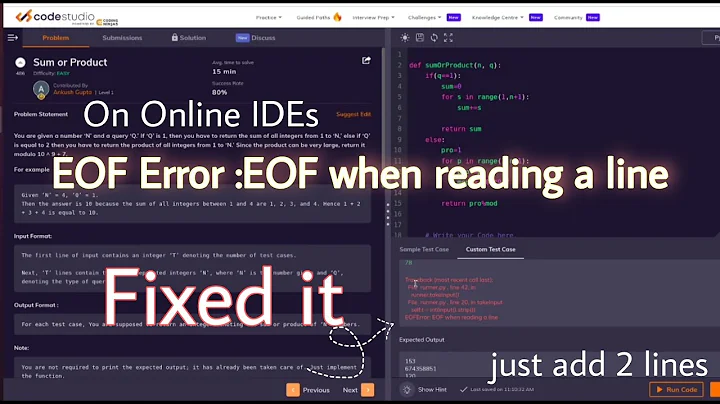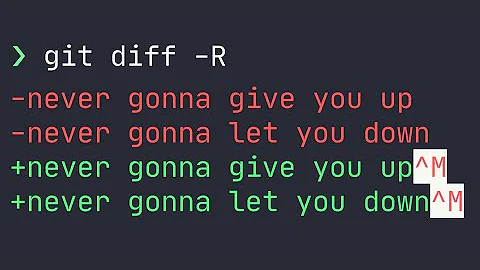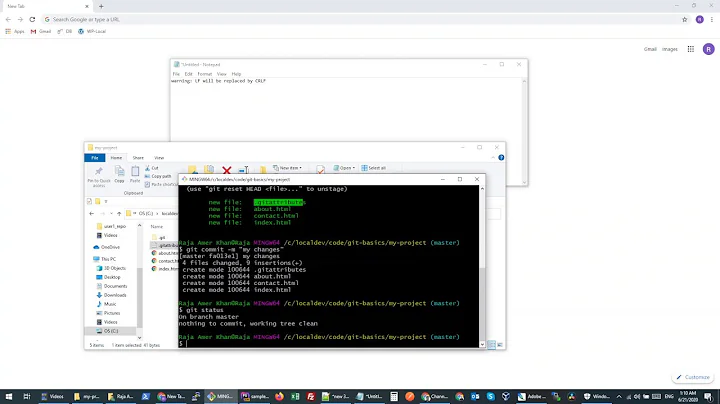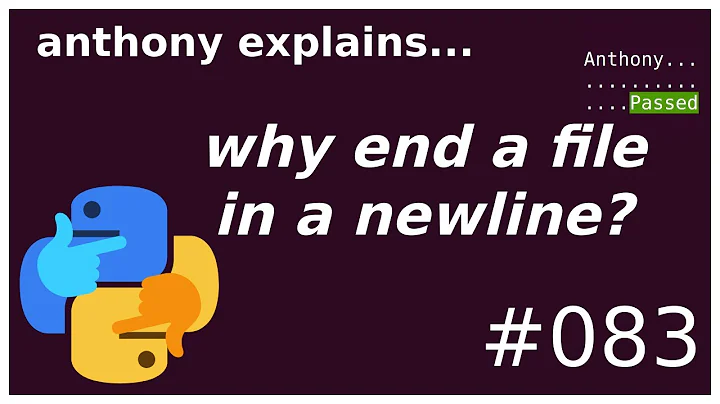git: new blank line at EOF
Solution 1
There are two issues, here.
-
you are confused about "newline" vs "new line":
A "new line" is an actual empty line (contains only a "newline" character) and a "newline" is a special character used to mark the end of the current line.
Most compilers, interpreters and Unix tools expect your text files to end with a newline to avoid ambiguity when dealing with multiple files, not a "new line".
Most editors, Vim included, add that necessary character at the end of every line, last line included, so there's nothing to do on your side to ensure that requirement is met.
Especially not adding a "new line" at the EOF.
-
you are probably used to bad behavior:
The "newline" character is traditionally interpreted as a "line terminator" by Unix tools, most compilers and Vim. This means that whatever comes after that character is considered to be on another line. Since that character is the last one in the file, there's no reason to show a line that is not there to the user.
Alas, most GUI editors interpret it as a "line separator", meaning that it marks the separation between two lines and those editors usually show a non-existing line at the end of your file to satisfy that interpretation.
I'm probably assuming too much, but it looks like you are used to that wrong behavior and try to mimic it by adding a totally unnecessary "new line" at the end of your files.
Either you keep adding "new lines" at the bottom of your source files, consider that as some sort of formatting and coding guideline and stop considering those Git messages as error messages.
Or you stop adding those useless "new lines".
I would go with the second option.
Solution 2
From the git diff documentation:
--check
Warn if changes introduce whitespace errors. What are considered whitespace errors is controlled by
core.whitespaceconfiguration. By default, trailing whitespaces (including lines that solely consist of whitespaces) and a space character that is immediately followed by a tab character inside the initial indent of the line are considered whitespace errors. Exits with non-zero status if problems are found. Not compatible with --exit-code.
Correspondingly, the git config documentation:
core.whitespace
A comma separated list of common whitespace problems to notice. git diff will use
color.diff.whitespaceto highlight them, and git apply --whitespace=error will consider them as errors. You can prefix-to disable any of them (e.g.-trailing-space):
blank-at-eoltreats trailing whitespaces at the end of the line as an error (enabled by default).
space-before-tabtreats a space character that appears immediately before a tab character in the initial indent part of the line as an error (enabled by default).
indent-with-non-tabtreats a line that is indented with space characters instead of the equivalent tabs as an error (not enabled by default).
tab-in-indenttreats a tab character in the initial indent part of the line as an error (not enabled by default).
blank-at-eoftreats blank lines added at the end of file as an error (enabled by default).
trailing-spaceis a short-hand to cover bothblank-at-eolandblank-at-eof.
cr-at-eoltreats a carriage-return at the end of line as part of the line terminator, i.e. with it, trailing-space does not trigger if the character before such a carriage-return is not a whitespace (not enabled by default).
tabwidth=<n>tells how many character positions a tab occupies; this is relevant for indent-with-non-tab and when Git fixes tab-in-indent errors. The default tab width is 8. Allowed values are 1 to 63.
As you can see, blank-at-eof is enabled by default. You can disable it by adding -blank-at-eof to the core.whitespace configuration, or alternatively by using your own core.whitespace configuration.
Related videos on Youtube
Maxim Chetrusca
Updated on June 25, 2022Comments
-
 Maxim Chetrusca almost 2 years
Maxim Chetrusca almost 2 yearsSo I run
git diff --checkbeforeadd-ing files andcommit-ing them, and on two specific files I getpath/filename:linenumber: new blank line at EOF. If I delete the last empty line in those files, I don't get any messages, but I think it is good style to end my files with a newline. Strangely enough, the other files which I think have exactly the same endings, don't give any messages. I am new to git, using git 2.0.1 on OS X Yosemite. I use vim as my editor.How can I have my files end with newline while avoiding this message? Should I ignore it?
-
 Maxim Chetrusca over 9 yearsIndeed, I realize now that I am confusing here "new line" with "newline". Thanks for pointing for the root of the problem!
Maxim Chetrusca over 9 yearsIndeed, I realize now that I am confusing here "new line" with "newline". Thanks for pointing for the root of the problem! -
 Maxim Chetrusca over 9 yearsthis indeed solves the problem but the other answer pointed to the actual root of the problem. Good answer though!
Maxim Chetrusca over 9 yearsthis indeed solves the problem but the other answer pointed to the actual root of the problem. Good answer though! -
Cam Jackson over 8 yearsGreat answer. Git has always complained when I don't put a blank line on the end using most editors. When using vim, it complains if I do have that blank line on the end! It's nice to know that it's just because the editors themselves render the lines differently.
-
kirilloid over 6 yearsWhat’s the difference on binary level? For me both “new line” and “newline” look like “}\n”
-
 romainl over 6 years"On a binary level", a newline character is a
romainl over 6 years"On a binary level", a newline character is a\n(or\ron old macs, or\r\non windows) and a new line is an empty line, with no other character than a newline character, essentially a sequence of two newline characters. But most text editors and text processing tools can be configured to put a newline character at the end of the last line or not and some of them default to not do that. Since most unix-ish systems and tools like Git expect text files and streams to end with a newline character it is best to set up your text editor to add that newline character. -
 alper almost 3 yearsI am having following error:
alper almost 3 yearsI am having following error:unknown option blank-at-eof'














